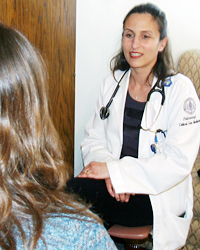Feature Story
Health Center Today, March 11, 2010
Springing Ahead a Reminder of the Importance of Sleep
By Chris DeFrancesco

Dr. Jennifer Kanaan says sleep disorders often are related to other health problems and, in the case of children and teens, can lead to behavioral and school performance problems. The Health Centerís Sleep Disorders Center sees patients as young as 2 years old.
Photo by Chris DeFrancesco
The switch to daylight saving time is a good time to think about the importance of sleep, say experts at the Health Centerís Sleep Disorders Center.
"Sleep problems can manifest themselves in a number of different ways, and not always obvious ones," says Dr. Jennifer Kanaan. "And in no place might this be more evident than in the pediatric population."
Kanaan, who specializes in sleep disorders in women, children and teens, says studies are turning up data that some may find startling:
- Research suggests sleep-deprived adolescents are more likely to be suicidal.
- Itís not uncommon for sleep deprivation to be misdiagnosed as attention deficit-hyperactive disorder, or ADHD.
- Sleep deprivation makes children more prone to accidents, the leading cause of childhood injury.
- Data show a link between childhood obesity and pediatric sleep apnea, and apnea can affect school performance.
"Forty percent of parents report their kids have sleep problems," Kanaan says. "Itís enormously prevalent, but no one talks about it. Parents who are concerned about their kidsí school performance should evaluate how their kids are sleeping."
Thatís because well-rested children show up for school ready to learn, their cognitive function more receptive to the dayís lessons. And itís one very good reason to give serious thought to starting school later in the morning, says Dr. Daniel McNally, medical director of the Sleep Disorders Center.
"As kids progress from elementary to middle to high school, their school start times become earlier," McNally says. "This is counter to their biological clocks. When they become adolescents and teenagers, they become vulnerable to sleep phase shift Ė simply put, their body clocks tell them to go to bed late and wake up late. Their need for sleep goes up with adolescence, not down. But, in reality, teenagers don't get the sleep they need. So really, high school should be starting the latest, not the earliest."
The Sleep Disorders Center is equipped to see patients as young as age 2.
"We have the ability to take a family approach," Kanaan says. "Adults with behavioral sleep problems Ė and by that we mean correctable sleep habits Ė tend to have kids with behavioral sleep problems."
The Health Center has an uncommonly high number of physicians Ė four Ė who are board certified in sleep: Kanaan, McNally, Dr. Debapriya Datta, and Dr. Mark Meterksy.
"Weíre working to become a referral center for the state, even regionally," Kanaan says.


